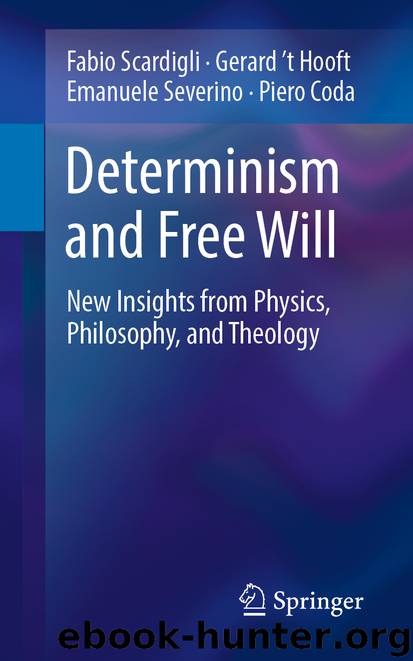Determinism and Free Will by Fabio Scardigli & Gerard ’t Hooft & Emanuele Severino & Piero Coda

Author:Fabio Scardigli & Gerard ’t Hooft & Emanuele Severino & Piero Coda
Language: eng
Format: epub
ISBN: 9783030055059
Publisher: Springer International Publishing
V
These questions underline the central thesis of my philosophical inquiry: that every state in the world, every part of every state, the content of every instant, every entity, and therefore every event, is eternal. To be eternal means that it is impossible for it not to be.
This impossibility is not ascribable to any other form that impossibility has taken in the wisdoms of the West, therefore not even to the meaning that scientific knowledge confers upon this word. It is, however, interesting to note that there is a way of interpreting the theory of relativity as an affirmation of the eternity of every state in the world, and that Einstein did not oppose this interpretation.
In his Intellectual Autobiography (1976), Karl Popper writes, referring to Einstein: “The main topic of our conversations was indeterminism. I tried to persuade him to abandon his determinism, which in practice consisted in the idea that the world was a closed universe, of Parmenidean type, four-dimensional, in which change was a human illusion, or something very similar. (He agreed that this was his opinion, and discussing it, I called him ‘Parmenides’).” Einstein accepted the interpretation that embodies the theory of relativity in the philosophy of Parmenides. Later he would show less confidence in his adherence to determinism; but it does not seem that his Parmenidism had faltered.
Popper’s intention of converting Einstein to Heisenberg’s indeterminism was already an attempt to reconcile what appears to be irreconcilable: the theory of relativity and quantum mechanics. An attempt that in physics has attracted much interest and is still ongoing. Of course, the discussion between Popper and Einstein is not about the ‘historical’ Parmenides, the one discussed by Plato, Aristotle, and Hegel. The ‘historical’ Parmenides supported the eternity of pure Being, not of beings, or entities, i.e., of things that are. Almost from the beginning, my writings have instead shown the necessity that each thing-that-is is eternal, where “thing” is to be understood in the widest possible sense, including every event, relationship, and gradation, and thus every space-time event, i.e., also (but not only) the events of the four-dimensional chronotope of the Einsteinian universe.
And this necessity is the impossibility, mentioned above, for any being not to be eternal. It should be noted that the ‘logic’ under which the theory of relativity states that everything is eternal is essentially different from the necessity that my writings address. Also because science nowadays—including the theory of relativity—recognizes the hypothetical and provisional character of its own theses, even the most “confirmed” ones. And it is in this sense that philosophy in its essence can go beyond science (which, on the other hand, is now concerned about power, not about “truth”). The fact remains, however, that the Parmenidean thesis of the theory of relativity sounds identical to the thesis of my writings, that every being is eternal—even if the foundations of the two theses are radically different, so that the theses themselves are different.
And that’s not all. Popper and Einstein agree that for Einstein, as for
Download
This site does not store any files on its server. We only index and link to content provided by other sites. Please contact the content providers to delete copyright contents if any and email us, we'll remove relevant links or contents immediately.
The Complete Stick Figure Physics Tutorials by Allen Sarah(7362)
Secrets of Antigravity Propulsion: Tesla, UFOs, and Classified Aerospace Technology by Ph.D. Paul A. Laviolette(5364)
Thing Explainer by Randall Munroe(3930)
The River of Consciousness by Oliver Sacks(3598)
The Order of Time by Carlo Rovelli(3188)
How To by Randall Munroe(3102)
A Brief History of Time by Stephen Hawking(3022)
I Live in the Future & Here's How It Works by Nick Bilton(2990)
What If?: Serious Scientific Answers to Absurd Hypothetical Questions by Randall Munroe(2695)
The Great Unknown by Marcus du Sautoy(2690)
Midnight in Chernobyl by Adam Higginbotham(2541)
Blockchain: Ultimate Step By Step Guide To Understanding Blockchain Technology, Bitcoin Creation, and the future of Money (Novice to Expert) by Keizer Söze(2483)
Networks: An Introduction by Newman Mark(2403)
The Meaning of it All by Richard Feynman(2349)
Easy Electronics by Charles Platt(2325)
The Tao of Physics by Fritjof Capra(2271)
Midnight in Chernobyl: The Untold Story of the World's Greatest Nuclear Disaster by Adam Higginbotham(2220)
Introducing Relativity by Bruce Bassett(2115)
When by Daniel H Pink(2113)
